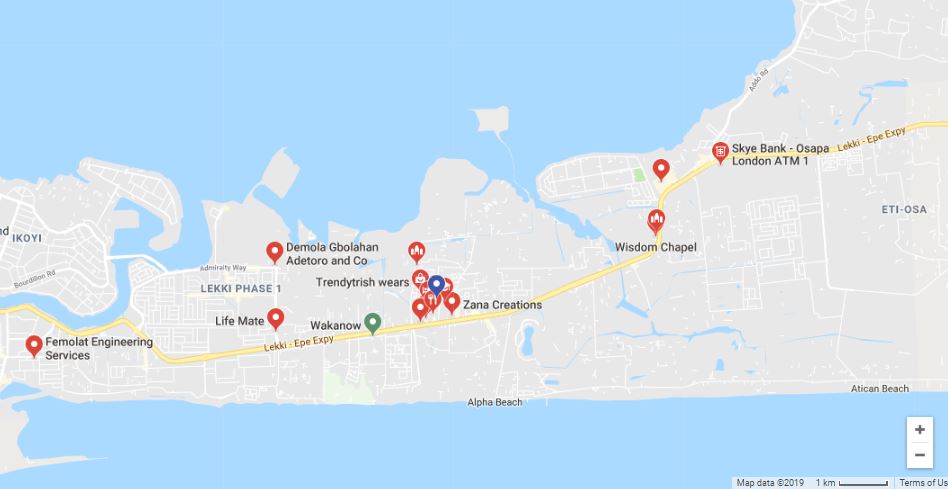Google introduces Nigerian-voiced travel mode maps for motorcycles, cars
Google Nigeria has introduced dedicated travel mode in Google Maps to provide directions and navigation for motorcycles, cars in a Nigerian voice. The Google Nigeria Country Director, Mrs Juliet Ehimuan-Chiazor disclosed this in Lagos while announcing newly introduced products and features by Google in Nigeria and across Africa. Apart from the navigation instructions in a […]

Osapa London, Lagos.
IMAGE CREDITS: Google Maps.
Google Nigeria has introduced dedicated travel mode in Google Maps to provide directions and navigation for motorcycles, cars in a Nigerian voice.
The Google Nigeria Country Director, Mrs Juliet Ehimuan-Chiazor disclosed this in Lagos while announcing newly introduced products and features by Google in Nigeria and across Africa.
Apart from the navigation instructions in a Nigerian voice for motorcycle and car driving modes, Ehimuan-Chiazor said Google has also introduced new Street View imagery, Gallery Go, Google Go updates and Google Lens.
Other products according to her were, Bolo and a Nigerian culinary experience from Google Arts and Culture.
“Every day, people in Nigeria, Africa and around the world turn to Google for help and we hope that the products and updates we are announcing today will make Google even more helpful for fueling people’s hustles and getting things done.
“We remain committed to bringing the transformational power of technology to everyone in Nigeria and Africa as a whole,” she said.
Ehimuan-Chiazo pointed out that in 2017, Google made a commitment to train 10 million people in Africa on digital skills over five years, and to date, four million Africans had been trained.
She added that Google committed additional 4 million dollar to support youth empowerment, gender equality and agriculture, alongside piloting new initiatives to power the social impact ecosystem and promote researches for African youth.
Mr Ramesh Nagarajan, Director Product Management, Google Maps disclosed that in the next few months, Google will introduce a new directions experience in Lagos for informal transit which would bring “Danfo’’ routes into Google Maps.
“Danfo’’ is a popular Lagos commercial shuttle and a staple of the cosmopolitan city painted in yellow and white.
Nagarajan said that to help make it easier to visually explore places in Nigeria, Google was publishing more panoramic imagery on Street View.
He said that starting with imagery of Lagos two years ago, Google had added Street View imagery of Abuja, Benin City, Enugu and Ibadan – with almost 12 thousand kilometers of roads added.
In his own contribution, Mr Paul Nicholas, Director, Trust and Safety, Google, said that to ensure safety of children, Google introduced an Online Safety Curriculum for students in primary and secondary schools.
“We are targeting 56million Nigerian students every year with this curiculum and this is done in collaboration with the Public and Private Development Centre, Federal Ministry of Education and the Nigerian Educational Research and Development Council,’’ he said.
Also, Mr Ben Greenwood, Product Manager Next Billion Users said Google launched the “Gallery Go’’, a fast and smart photo gallery designed for users who do npot have a reliable internet connection.
He explained that the product was introduced because with the growth of Android, more and more Nigerians had phones that take pictures, but not everyone had access to reliable, high-speed internet or cloud backup to quickly find a photo.
Greenwood said that Gallery Go brought many of the best features of Google Photos on device, to help them find, edit and manage their photos even when they are offline.
He said the App was only 10MB to keep the phone light and fast, so that one could spend more time capturing memories.
“Gallery Go is available today on Google Play for devices running Android 8.1 (Oreo) or higher and will come pre-installed as the gallery app on the Itel S15 and select A55 devices, which will be available in Nigeria soon,” he said.
He added that Google launched Google Go last year, making it easier for people to discover the best of the internet even on low-RAM smartphones or unstable network connections.
“Today, Google announced updates to make Google Go even more useful. The Discovered feed has been integrated within Google Go to help people stay in the know with their interests.
“It provides an ongoing look at the things they care about, like the latest content on their football team, people of interest, music and news stories.
“From next week, users will also be able to access the Assistant directly from Google Go in a new Nigerian voice.
“Using only their voice, they will be able to ask Google to call their mum, play the latest Burna Boy video, or find the best Jollof in town,” he said.
In his own contribution, Mr Nitin Kashyap, said that the introduction of Google Lens inside Google Go, would help people read, translate, and search the words they see simply by using their camera.
“Users can open Lens, point it at a sign, and listen to the words read out loud. If they don’t speak the language, they can translate it into their own.
“Today, Google is also launching support for Hausa, Yoruba, and Igbo,’’ he said..
Kashyap said that “Bolo’’, another feature introduced by Google is a speech-based reading app that helps kids learn how to read in English and encourages them to read out loud.
He said the App provides individual with customised feedback to help improve their reading capabilities.
“We launched Bolo in India earlier this year and today, we are bringing it to Nigeria and Ghana,” he said.
Mr Laurent Gaveau, Head of Lab, Google Arts and Culture, said that the Google Arts & Culture, had cooked up a project, ‘Come Chop Bellefull: A Taste of Nigeria’, which pays tribute to Nigeria’s vibrant and diverse food culture.
He said the initiative has to do with rich food culture of Nigeria, containing 2000 high resolution images and 30 stories created in collaboration with the Centenary Project at the Pan-Atlantic University. (NAN)
